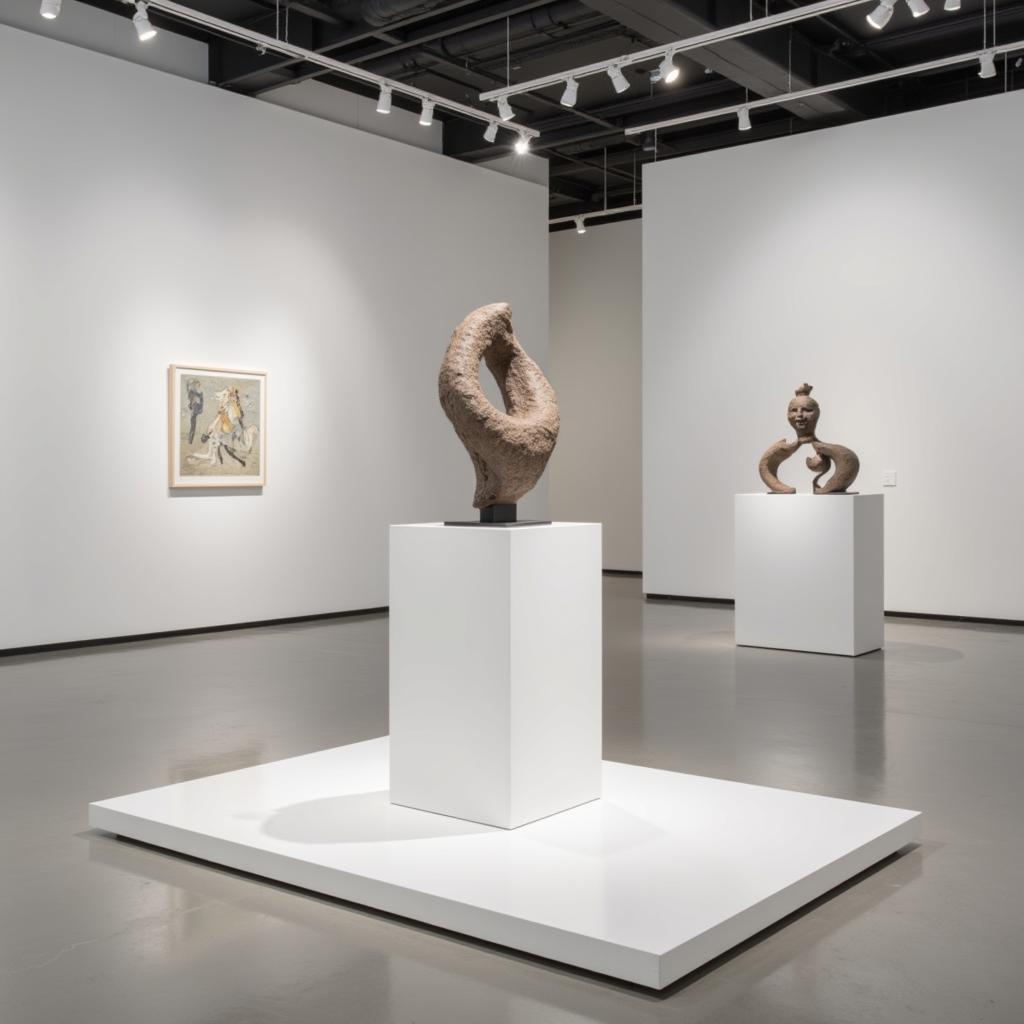Pedestals for Art: Elevating Your Creations
Choosing the right pedestal for art can make all the difference in how your work is perceived. Whether you’re showcasing sculptures, installations, or even design objects, the pedestal acts as a stage, drawing the eye and enhancing the visual impact. From minimalist platforms to elaborate stands, Pedestals For Art come in a range of styles, materials, and sizes to suit every artistic vision. Let’s explore the world of pedestals and discover how to choose the perfect one to elevate your creations.
 Modern Sculpture Pedestals
Modern Sculpture Pedestals
Finding the Perfect Harmony: Matching Pedestals and Art
Selecting the right pedestal is an art in itself. It’s about finding the perfect harmony between the artwork and its display, ensuring that the pedestal enhances rather than overshadows the piece. Consider these factors when choosing a pedestal for your art:
- Style: The style of the pedestal should complement the artwork. A minimalist sculpture might pair well with a sleek, modern pedestal, while a traditional bust might call for a more ornate stand. For instance, a pedestal art deco style could beautifully complement a vintage sculpture.
- Material: Pedestals come in a variety of materials, each with its own aesthetic and practical considerations. Wood offers a classic, warm feel, while metal lends a contemporary, industrial edge. Acrylic provides a transparent, lightweight option, while concrete offers a bold, architectural statement.
- Height: The height of the pedestal plays a crucial role in how the artwork is viewed. A taller pedestal can give the piece more presence, while a shorter pedestal might encourage a more intimate viewing experience. Consider the scale of the artwork and the intended viewing distance when choosing the height.
- Size and Shape: The size and shape of the pedestal should be proportionate to the artwork. A small, delicate sculpture might be overwhelmed by a large, imposing pedestal, while a large-scale installation might require a substantial base for stability.
Beyond the Basics: Pedestals as Artistic Statements
Pedestals can be more than just functional platforms; they can be artistic statements in their own right. Consider these creative approaches to pedestals:
- Sculptural Pedestals: Integrate the pedestal into the artwork itself, creating a seamless transition between the display and the piece. Imagine a sculpture emerging organically from a pedestal that mimics its form or texture.
- Interactive Pedestals: Engage viewers with pedestals that incorporate light, sound, or movement. A pedestal could be designed to rotate slowly, revealing different facets of the artwork, or it could emit a subtle glow, enhancing the artwork’s ethereal quality.
Showcasing Your Art: Pedestals in Different Settings
Whether you’re exhibiting in a gallery, participating in an art fair booth, or displaying your art at home, the right pedestal can elevate the presentation:
- Galleries and Museums: In formal exhibition spaces, pedestals often take on a minimalist aesthetic, allowing the artwork to be the focal point. Neutral colors and simple geometric forms are common choices.
- Art Fairs: When showcasing your work at art fairs, pedestals need to be both eye-catching and functional. Consider lightweight, portable options that are easy to assemble and transport.
- Homes and Studios: When displaying art in your own space, you have more freedom to experiment with pedestals that reflect your personal style. Don’t be afraid to get creative and choose pedestals that make a statement.
Creating a Cohesive Display: Pedestals in Conversation
When displaying multiple artworks, consider how the pedestals interact with each other to create a cohesive visual narrative.
- Varying Heights: Create visual interest by using pedestals of different heights. This helps to guide the viewer’s eye through the exhibition and prevents the display from feeling monotonous.
- Grouping by Theme or Material: Use pedestals to create thematic groupings within your exhibition. For example, you might display all of your ceramic sculptures on pedestals made from natural materials like wood or stone.
FAQs About Pedestals for Art
Q: What are the standard sizes for art pedestals?
A: There are no strict standard sizes, but common dimensions range from 30 inches to 42 inches in height for sculptures and 18 inches to 24 inches for smaller objects.
Q: Can I use a pedestal outdoors?
A: Yes, but choose a material that can withstand the elements, such as powder-coated steel, concrete, or weather-resistant wood.
Q: How do I secure my artwork to a pedestal?
A: Methods vary depending on the artwork and pedestal, but common options include museum wax, clear fishing line, or specialized mounting brackets.
Q: Where can I find unique or custom-made pedestals?
A: Online marketplaces, specialty art supply stores, and local artisans are great resources for finding distinctive pedestals. You can also work with a fabricator or designer to create a custom piece tailored to your exact specifications.
Need Help Finding the Perfect Pedestal?
We’re here to help you find the perfect pedestal to showcase your art! Contact us at Phone Number: 02462573573, Email: [email protected], or visit us at Savico Megamall, 7-9 Đ. Nguyễn Văn Linh, Gia Thụy, Long Biên, Hà Nội 10000, Việt Nam. Our team is available 24/7 to assist you.
Explore More:
- Stands for glass art offer unique ways to display delicate glass creations.
- Looking for a dedicated space for your artistic endeavors? Discover the functionality and elegance of an art drafting table desk.





